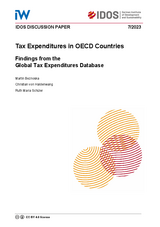Discussion Paper
Tax expenditures in OECD countries: findings from the Global Tax Expenditures Database
Beznoska, Martin / Christian von Haldenwang / Ruth Maria SchülerDiscussion Paper (7/2023)
Bonn: German Institute of Development and Sustainability (IDOS)
ISBN: 978-3-96021-208-9
DOI: https://doi.org/10.23661/idp7.2023
Preis: 6 €
This Discussion Paper is the English version of: Beznoska, M., von Haldenwang, C., & Schüler, R. M. (2022). Steuervergünstigungen in den OECD-Ländern. Erkenntnisse aus der Global Tax Expenditures Database (IW-Report 34/2022). Köln: Institut der deutschen Wirtschaft.
The Global Tax Expenditures Database (https://GTED.net/) collects national reports on tax expenditures for 101 countries for the period from 1990 to the present. Based on these data, the development of tax expenditures in the 38 OECD countries between 1999 and today is examined. A look at the data shows that even in countries with high GDP and comprehensive tax coverage, reporting is often incomplete. For a subset of 16 OECD countries for which (relatively) continuous reporting over the period is available, we look at the development of tax benefits for households and firms. We can show that data availability improves over time. For the development of business tax expenditures, a weakly significant positive trend can be identified in terms of tax revenues foregone, driven mainly by the Netherlands and Ireland. Both countries are known for wanting to strengthen their business location through generous tax expenditures for businesses. Tax expenditures for private households, which are on average higher than the level of tax expenditures for businesses in the countries under review, do not show any significant time trend, even though they were increasingly used to relieve the burden on private households and businesses during the financial crisis of 2008/09. In order to compare tax expenditures between countries and to better assess their effectiveness, regular reporting at the national level, transparent definitions and ideally uniform standards would be helpful. Regular monitoring by a commission of experts could contribute to the consistency and comparability.
Kontakt
Cornelia Hornschild
Koordinatorin Publikationen
E-Mail Cornelia.Hornschild@idos-research.de
Telefon +49 (0)228 94927-135
Fax +49 (0)228 94927-130
Alexandra Fante
Bibliothekarin/Open Access-Koordinatorin
E-Mail Alexandra.Fante@idos-research.de
Telefon +49 (0)228 94927-321
Fax +49 (0)228 94927-130




